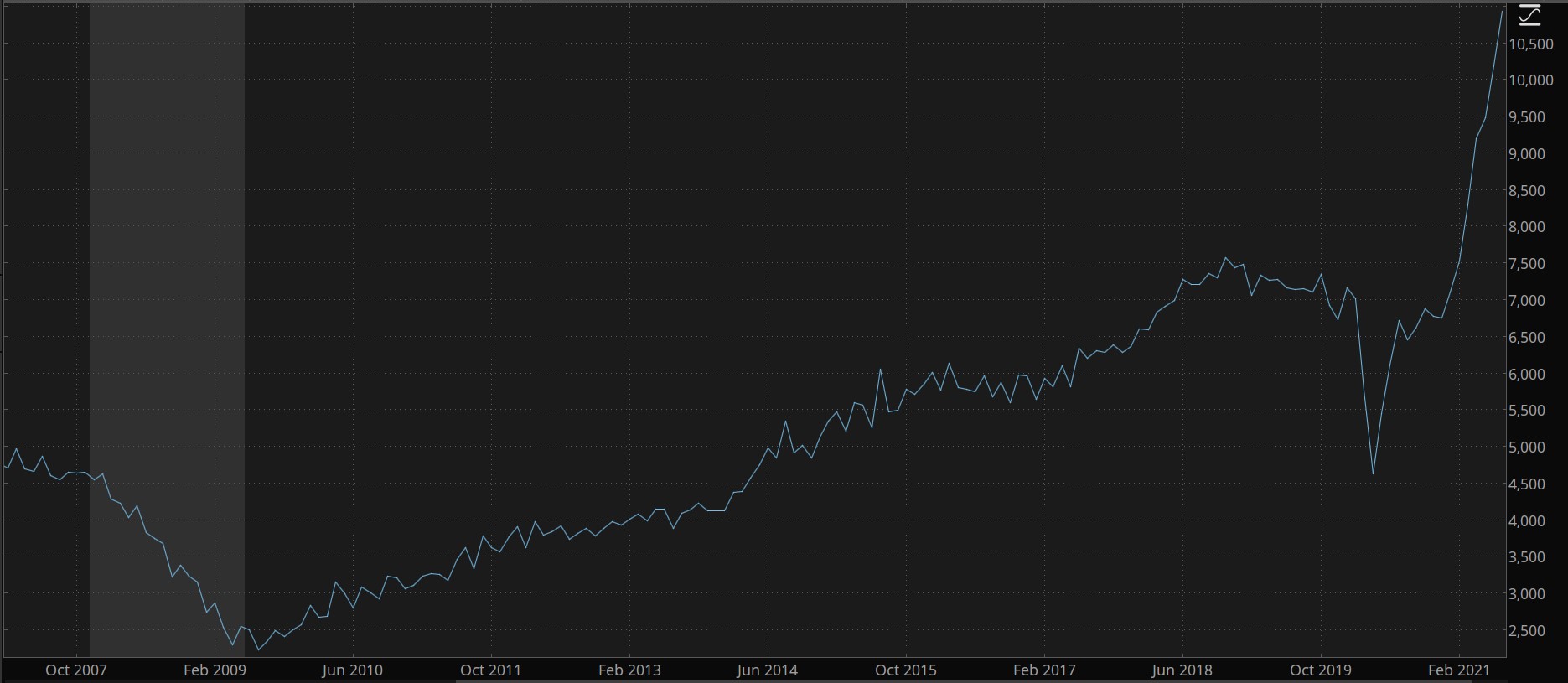Goldman Sachs Downgrades U.S. Economy has sent ripples across financial markets worldwide. The decision by one of the most influential investment banks to lower its outlook on the U.S. economy signals potential challenges ahead. As investors and policymakers grapple with this downgrade, understanding the reasoning behind it and its implications is crucial. This article dives deep into the factors driving this decision, its potential impact, and what it means for the global economy.
In recent months, economic indicators have painted a mixed picture of the U.S. economy. While some sectors show resilience, others face significant headwinds. Goldman Sachs's downgrade reflects a cautious stance based on data-driven analysis and expert insights. As we explore this topic further, we'll uncover the key drivers of this decision and how it aligns with broader economic trends.
This article aims to provide a thorough examination of the situation, ensuring readers gain a comprehensive understanding of the implications of Goldman Sachs's downgrade. Whether you're an investor, economist, or simply someone interested in the global financial landscape, this analysis will equip you with the knowledge to navigate the complexities of today's economy.
- Mkvin Movie Your Ultimate Guide To The World Of Cinematic Masterpieces
- Prmovies Netflix Download Your Ultimate Guide To Streaming And Downloading Movies
Table of Contents
- Overview of Goldman Sachs
- Goldman Sachs Downgrades U.S. Economy
- Key Factors Behind the Downgrade
- Potential Impact on the Economy
- Global Economic Repercussions
- Policy Responses to the Downgrade
- Market Reactions and Investor Sentiment
- Historical Context of Economic Downgrades
- Data and Statistics Supporting the Analysis
- Conclusion and Future Outlook
Overview of Goldman Sachs
Goldman Sachs is a leading global investment bank known for its expertise in financial services, investment management, and securities trading. Established in 1869, the firm has played a pivotal role in shaping modern finance. Its reputation for rigorous analysis and strategic insights makes its decisions, such as the recent downgrade of the U.S. economy, highly influential.
Key Milestones in Goldman Sachs's History
Throughout its history, Goldman Sachs has been involved in significant financial events that have shaped the global economy. Below are some of the key milestones:
- 1869 - Founding of Goldman Sachs by Marcus Goldman.
- 1930s - Expansion into investment banking during the Great Depression.
- 1999 - Initial public offering (IPO) on the New York Stock Exchange.
- 2008 - Navigating the financial crisis with government support.
Goldman Sachs Downgrades U.S. Economy
The decision by Goldman Sachs to downgrade the U.S. economy comes amid concerns over inflation, rising interest rates, and geopolitical tensions. This downgrade reflects a cautious approach to forecasting, emphasizing the need for policymakers and businesses to prepare for potential economic slowdowns.
- Wwwmovierulztelugu Your Ultimate Guide To Telugu Movies
- Hd Hub B4u Your Ultimate Guide To Highdefinition Streaming
Reasons for the Downgrade
Several factors contributed to Goldman Sachs's decision:
- Persistent inflationary pressures.
- Uncertainty surrounding fiscal policies.
- Global supply chain disruptions.
Key Factors Behind the Downgrade
To understand the rationale behind Goldman Sachs's downgrade, it's essential to examine the economic indicators and trends influencing this decision. These factors include:
- Inflation rates exceeding expectations.
- Slowing consumer spending.
- Geopolitical risks impacting trade relations.
Each of these elements plays a critical role in shaping the economic outlook, making Goldman Sachs's analysis particularly relevant in today's uncertain environment.
Analysis of Economic Indicators
Data from the U.S. Bureau of Labor Statistics and the Federal Reserve reveal concerning trends. For instance, inflation has remained persistently high, with the Consumer Price Index (CPI) increasing by 6% year-over-year. Such data supports Goldman Sachs's cautious stance on the economy.
Potential Impact on the Economy
The downgrade by Goldman Sachs could have far-reaching consequences for the U.S. economy. Businesses may become more risk-averse, potentially leading to reduced investments and hiring freezes. Consumers, too, might tighten their spending as confidence wanes.
Effects on Different Sectors
Various sectors will experience the impact differently:
- Technology: Companies may delay expansions and focus on cost-cutting measures.
- Retail: Lower consumer spending could lead to reduced sales and profit margins.
- Real Estate: Higher interest rates may dampen demand for housing.
Global Economic Repercussions
The U.S. economy's health has a ripple effect on the global stage. A downgrade by Goldman Sachs could lead to increased volatility in international markets. Emerging economies, in particular, may face challenges as capital flows shift in response to perceived risks.
How Global Markets React
Investors worldwide closely monitor developments in the U.S. economy. A downgrade by a reputable institution like Goldman Sachs often triggers reassessments of asset allocations and risk assessments. This can result in shifts in currency values, commodity prices, and stock market performance.
Policy Responses to the Downgrade
In response to Goldman Sachs's downgrade, policymakers may consider implementing measures to stabilize the economy. These could include adjustments to monetary policy, fiscal stimulus packages, or regulatory reforms aimed at boosting confidence and growth.
Monetary Policy Adjustments
The Federal Reserve may reassess its interest rate policies to address inflationary pressures while supporting economic growth. Balancing these objectives is a delicate task that requires careful consideration of current economic conditions.
Market Reactions and Investor Sentiment
Investor sentiment plays a crucial role in shaping market reactions to economic news. The downgrade by Goldman Sachs has already sparked discussions among analysts and traders about its implications for portfolio strategies. Many are reevaluating their positions in light of the new outlook.
Strategies for Investors
Investors can adopt several strategies to mitigate risks associated with the downgrade:
- Diversifying portfolios across asset classes.
- Allocating funds to defensive sectors such as healthcare and utilities.
- Monitoring economic indicators closely for further guidance.
Historical Context of Economic Downgrades
Historically, economic downgrades have often preceded periods of economic adjustment. By studying past events, we can gain insights into how markets and economies respond to similar situations. For example, the 2008 financial crisis saw widespread downgrades that ultimately led to significant changes in regulatory frameworks.
Lessons from the Past
Key lessons from previous downgrades include the importance of transparency, timely policy responses, and maintaining investor confidence. These principles remain relevant today as stakeholders navigate the current economic landscape.
Data and Statistics Supporting the Analysis
Supporting this analysis are various data points and statistics from reputable sources:
- U.S. Bureau of Labor Statistics: CPI increase of 6% year-over-year.
- Federal Reserve: Interest rate hikes aimed at controlling inflation.
- International Monetary Fund: Global growth projections revised downward.
These figures underscore the validity of Goldman Sachs's assessment and highlight the urgency of addressing underlying economic issues.
Conclusion and Future Outlook
In conclusion, Goldman Sachs's downgrade of the U.S. economy reflects a cautious outlook based on current economic conditions and trends. While challenges lie ahead, proactive measures by policymakers and businesses can help mitigate potential negative impacts. Readers are encouraged to stay informed and consider the implications of this downgrade in their decision-making processes.
We invite you to share your thoughts in the comments section below or explore other articles on our site for further insights into the global economy. Together, we can navigate the complexities of today's financial landscape and prepare for a brighter future.
- Lisa Ortiz The Rising Star In The Entertainment Industry
- Hd For Hub The Ultimate Guide To Boost Your Digital Experience


